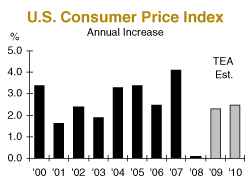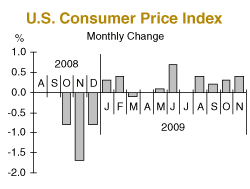|
December 23, 2009
..flation Debate
Written by Jeff Thredgold, CSP, President, Thredgold Economic Associates
The debate continues to rage among financial market players and economists as to whether inflation or deflation will be one of the many challenges facing the U.S. economy in coming years…
Rampant Inflation
 Vocal critics of the Federal Reserve and the Obama Administration argue that the current mix of monetary and fiscal policy is prone to disaster, i.e. rampant inflation. They suggest that the more than doubling of the Fed’s balance sheet from roughly $875 billion before the financial crisis to more than $2 trillion now…all done with newly created money…is the height of irresponsibility. Vocal critics of the Federal Reserve and the Obama Administration argue that the current mix of monetary and fiscal policy is prone to disaster, i.e. rampant inflation. They suggest that the more than doubling of the Fed’s balance sheet from roughly $875 billion before the financial crisis to more than $2 trillion now…all done with newly created money…is the height of irresponsibility.
Adding insult to injury in the eyes of the inflation wary are the unprecedented budget deficits recorded last year, this year, and likely for years to come. The inflation wary suggest that the ownership of gold, other commodities, and real estate are the best places to keep one’s financial assets.
A Run of Deflation
The other vocal camp suggests that one need merely look at Japan in the early 1990s for a whiff of what’s coming. The bursting of Japan’s real estate and asset bubble roughly 18 years ago led to a serious eight-year battle with the deflation disease, i.e. declining prices for assets of all types.
While declining prices for homes, commercial real estate, stocks, manufactured goods, and services might sound like a good thing to many, it is quickly followed by declining incomes. Significant amounts of spending are also delayed as people assume that prices will be lower if they wait longer.
 Is this not what is happening in dozens of residential and commercial RE markets today? Potential homebuyers and investors are excited about much greater values in various markets today, where prices have fallen 20%… 30%… 40%… 50%…, but aren’t many waiting for even further declines before they make an offer (with some waiting too long)? Is this not what is happening in dozens of residential and commercial RE markets today? Potential homebuyers and investors are excited about much greater values in various markets today, where prices have fallen 20%… 30%… 40%… 50%…, but aren’t many waiting for even further declines before they make an offer (with some waiting too long)?
The deflation camp points to soft home prices, declining values of commercial real estate in many markets, major slack in labor markets, and high levels of global anxiety as a menu for deflation in coming years. Their desired investment portfolio favors fixed-rate notes and bonds, especially those issued by the U.S. Government and highly rated companies.
In the Middle
The third view is that we will muddle our way through in regard to inflation pressures in coming years. The Fed will shrink its balance sheet back to more normal levels when financial flows improve by selling assets it has been buying. In addition, bond investors will remain so inflation sensitive that they will force the Fed’s hand, if necessary, to tighten monetary policy significantly in order to keep inflation at bay.
We have been here before during the late ’70s and early ’80s. The Fed responded at that time with a major monetary tightening to fight off double-digit inflation that engulfed the economy. The middle road suggests that the current massive Fed ease of 2008/2009 could be followed in coming years by a significant monetary tightening to corral inflation pressures.

Rebuilding
The estimated net worth of the American household rose during 2009’s third quarter, following a rise in the prior quarter as well. These increases follow a trouncing of American consumers’ balance sheets during the prior two years resulting from the Great Recession.
|
Happy Holidays!
And best wishes for a bright and joyful New Year from all of us at Thredgold Economic Associates!
Jeff, Kendall, Shawn, and Debi
|
|
Net worth increased to $53.4 trillion during 2009’s third quarter as a modest gain in home values and rising stock prices contributed to a 5.2% jump from the prior quarter’s $50.8 trillion estimate. Even so, the net worth of American households would have to climb another 23% to reach the estimated $66.0 trillion pre-recession peak during mid-2007.
Net worth is derived from the Federal Reserve’s quarterly flow of funds report. The total represents the difference between all household assets, including stocks, mutual funds, real estate, CDs, etc, minus all debts, including home mortgages, consumer debt, bank loans, etc.
Stocks owned by households rose an estimated $1.04 trillion in value during the July-September quarter. In addition, households cut down total debt at a very slight rate during the third quarter, with reductions in both mortgage debt and consumer credit outstanding.
Consumers have been aggressive, where possible, in paying down debt during the past two years in response to serious recession, painful job cuts, and higher levels of anxiety. In addition, the estimated savings rate has run at a 4.0%-5.0% annual rate in recent months, the highest level since 1998.
The rise in net worth is a positive sign and will likely be followed by another modest gain during 2009’s final quarter. Home values have continued to stabilize in numerous markets, while most major stock averages have risen to their highest levels in more than a year.
• Email this article to a friend
• Learn about econAmerica, Jeff’s latest book
|
|
Subscribe to the Tea Leaf
Like what you just read? Have Jeff Thredgold’s Tea Leaf emailed to you free each week. Subscribe today.
|
|
|

“Tea”ser
I never forget a face, but in your case I’ll be glad to make an exception.

“Tea”stimonial
“I have heard nothing but ‘rave reviews’ regarding your presentations at our Educational Conference, and our AgFirst Summit Meeting. You are quite unique in that you have the ability to transform the economic ‘numbers’ into a very interactive and enjoyable presentation.”
• More testimonials
Invite Jeff Thredgold to speak at your next conference, meeting, or client function
If you like the Tea Leaf, you’ll love Jeff Thredgold’s live presentations. Jeff takes your audience on a timely, engaging, and entertaining tour of the U.S. economy and financial markets. Debunking some of today’s most common economic myths, he offers a clear picture of how the American economy is really performing and what that means for the future of your finances.
• ***Watch Jeff Thredgold’s new demo video.***
• Download more information that you can e-mail to other decision makers.
• See Jeff Thredgold’s speaking calendar.
• Tell us about your event using our online form and we will contact you. Or, is there an individual in your organization you would like us to contact?
• Give us a call at 1-888-THREDGOLD (847-3346) to ask about Jeff’s availability and pricing for your event, or for any other information.
|
